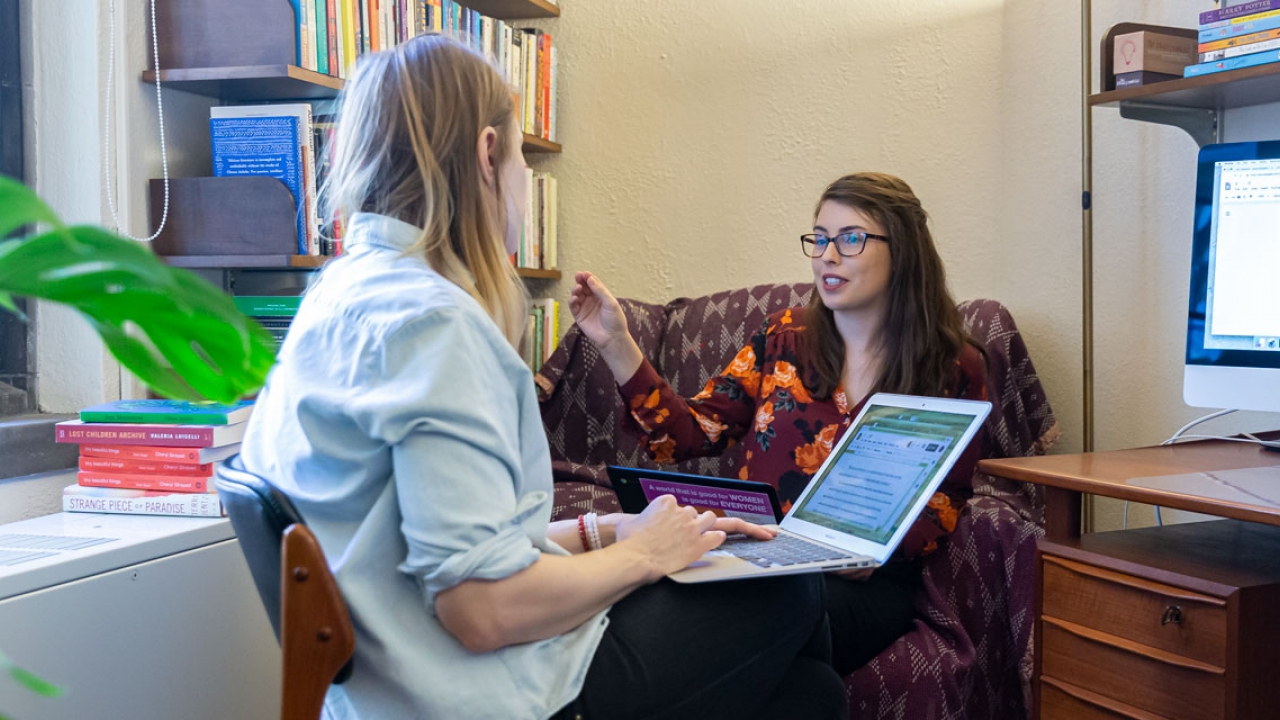At Wellesley, a Veteran Learns to Tell Her Story

“PFM—Pure Freaking Magic.”
That was how Ashley Anderson DS ’21 and her team of fellow “Nukes” referred to the complicated electrical and nuclear processes that powered the USS Theodore Roosevelt, the aircraft carrier Anderson helped operate while serving for six years in the U.S. Navy as a nuclear electronics technician.
Now, as a student of anthropology, English, and creative writing at Wellesley, Anderson has moved on from the military to pursue her lifelong dream. “I’ve always secretly wanted to be an English major,” Anderson said. “I love stories more than anything. But it was always something that was sort of laughed at growing up.”
Anderson first learned about the nuclear power program when a recruiter visited her high school chemistry class in Hope Mills, N.C. It sounded incredibly compelling, and the sign-on bonus and the two years of technical education she would receive in Nuclear Power School helped push her to pursue the opportunity.
“In many ways, seeking out more authority as a high-schooler wasn’t intuitive,” Anderson said. “My stepdad was in the Navy and was pretty strict. But when my mom explained how the benefits might help me attend college, it made more sense.”
Anderson was also spurred on by competition with her best friend, who was fielding calls from military recruiters after receiving a high score on the Armed Services Vocational Aptitude Battery (ASVAB), which measures strengths, weaknesses, and the potential for success in the armed forces. “My friend did well, and I wanted to see how I stacked up to her,” Anderson said. “We ended up with the same exact score.”
Anderson eventually joined the Navy as a nuclear electronics technician. Prior to deployment, she studied thermodynamics and nuclear physics and the complexities of nuclear marine propulsion, the energy system that powered the ship she would help run. She also learned about electrical theory and how to maintain instrumentation and control circuitry, and she trained to be a reactor operator.
“The longest I ever slept was six hours straight,” Anderson said, laughing, “so I learned to appreciate sleep, too.”
While on the aircraft carrier, Anderson went to London, the Mediterranean, the Persian Gulf, Bahrain, Dubai, and finally to San Diego. After her deployment ended, she began a new life at Wellesley as an emerging memoirist, practicing the art of storytelling.
“I had never heard of Wellesley, but one of my friends in the Navy had sisters who went here, and he thought I’d like it,” Anderson said. “The more I read about it, the more I thought I would, too. The Navy is still a hypermasculine, tough-guy environment, so the idea of coming to a place centered on empowering women appealed to me.”
Anderson credits the Navy as the place where she “learned how to learn,” but it is at Wellesley that she is learning how to write. After workshopping several pieces in the memoir writing course taught by visiting professor Lauren Holmes '07, Holmes asked if she had considered majoring in English and creative writing.
Currently, Anderson is writing about her childhood in an itinerant military family, her own experience in the Navy, and the six months after her enlistment ended, during which she traveled through South America and Europe. Upon graduation, she’d like to pursue an MFA or PhD in creative writing. She loves Mary Karr, Kurt Vonnegut, David Sedaris, Tom Robbins, Haruki Murakami, and most graphic novels, including Paper Girls, and Saga.
Anderson also loves Wellesley: “The professors, the staff, the students. The people are my favorite part. I ate pizza the other day with the poetry critic of the New Yorker. It’s awesome, being here, in the literal sense of that word.” Pure freaking magic.
Photo: Ashley Anderson DS ’21 (right) meets with Newhouse visiting professor of creative writing Lauren Holmes ’07 to discuss a short story she is working on that looks at the ways in which military enlistment impacts, and is informed by, the personal lives of those who serve.



